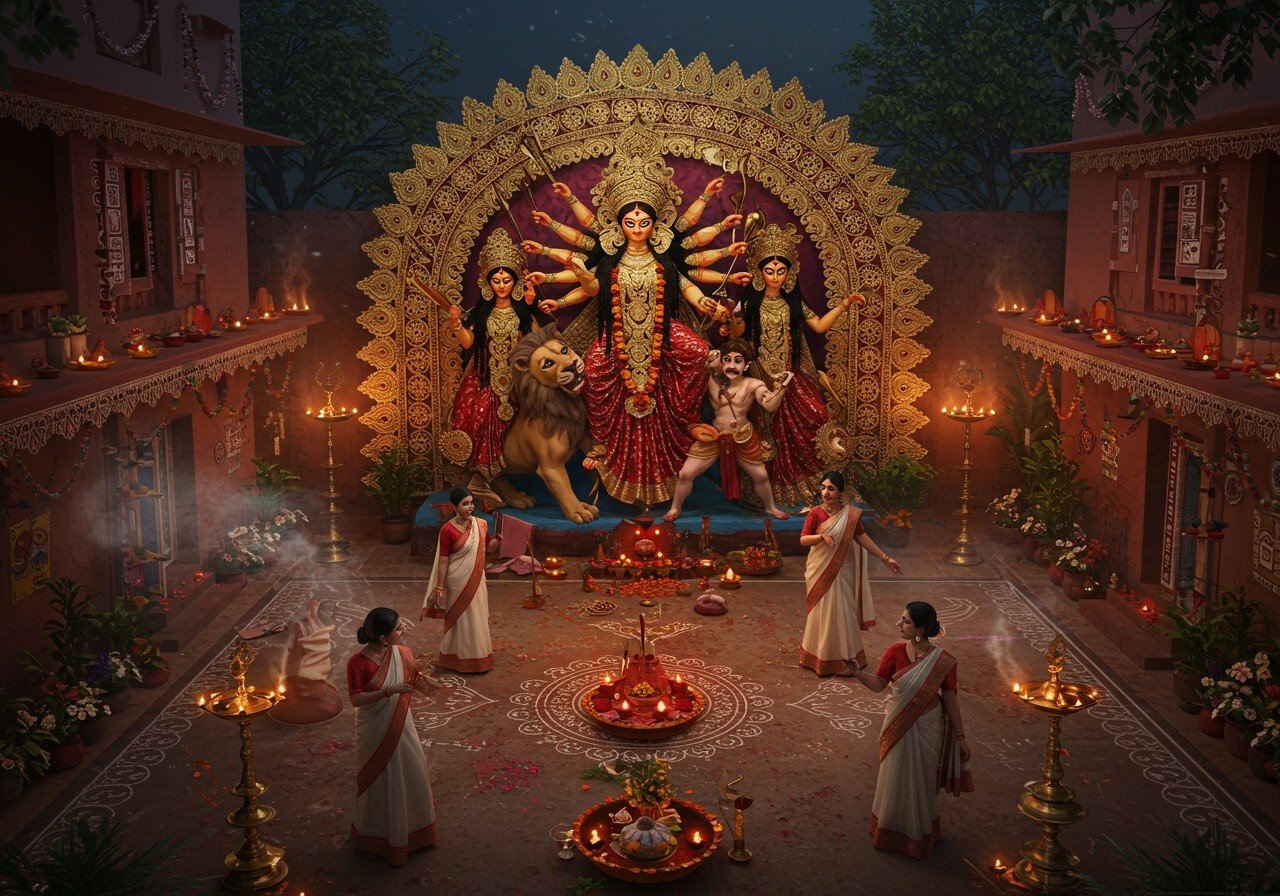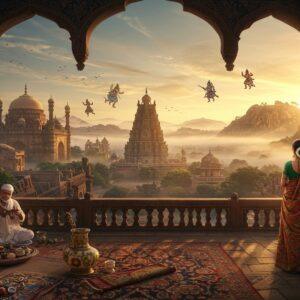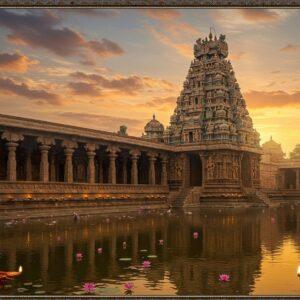
Bengali Hindu culture is a vibrant mosaic of traditions, rituals, and beliefs, deeply rooted in the heart of Bengal. This exploration delves into the unique aspects that define this community, offering insights into the distinctive festivals, culinary delights, attire, and customs that shape Bengali Hindu identity. For those who cherish tradition and value their cultural heritage, this journey offers a glimpse into the authentic practices and the profound significance they hold.
Celebrating the Divine: Bengali Hindu Festivals
Bengali Hindu festivals are a kaleidoscope of faith and celebration, each carrying unique customs and significance. Durga Puja, the most revered of all, is a magnificent spectacle of devotion, marked by grand pandals, elaborate idols, and vibrant processions. The rhythmic beats of the dhak and the fragrant aroma of dhuno fill the air, creating an atmosphere of pure joy and reverence. Poojn.in offers a range of beautiful clay doats perfect for Durga Puja, allowing you to bring the sanctity of the festival into your home.
Saraswati Puja, dedicated to the goddess of knowledge and wisdom, is a time when students and scholars seek blessings for academic success. The serene atmosphere, adorned with books and flowers, reflects the reverence for learning. Kali Puja, observed with fervor and devotion, coincides with Diwali in other parts of India, illuminating the night with fireworks and the glow of diyas. Poila Boishakh, the Bengali New Year, is a joyous occasion celebrated with traditional music, dance, and delectable feasts, marking new beginnings and shared cultural experiences. Prepare for Poila Boishakh with Poojn.in’s high-quality kumkum and roli, essential for welcoming the new year with auspiciousness.
Traditions and Customs: The Essence of Bengali Hindu Life
Bengali Hindu traditions offer a captivating glimpse into a world of rich customs and rituals. These traditions, woven into the fabric of daily life, reflect the deep-rooted cultural heritage of the Bengali people.
Religious Beliefs: A Tapestry of Deities
Bengali Hindus hold reverence for a diverse pantheon of deities, with goddesses like Kali and Durga occupying a special place of devotion. Shaktism, particularly the Kalikula tradition, enjoys prominence, exemplified by festivals like Durga Puja. Vaishnavism also holds a significant position, finding expression in the worship of Lord Krishna and his divine leelas.
The Significance of Festivals: More Than Just Celebrations
Beyond the vibrant festivities, festivals like Durga Puja serve as a platform for social gatherings and cultural exchange. Kali Puja, observed with intense devotion, resonates with the Diwali celebrations across India, while Poila Boishakh unites communities in a spirit of shared heritage. The inauguration of new ledgers (halkhata) on Poila Boishakh, seeking the blessings of Lakshmi and Ganesha, symbolizes the importance of prosperity and new beginnings. Begin your new year auspiciously with Poojn.in’s premium Hawan Samagri.
Wedding Rituals: A Journey of Togetherness
Bengali weddings are a symphony of colors, rituals, and emotions. From the pre-wedding Gaye Holud (turmeric ceremony) to the Saat Paak (seven rounds around the sacred fire), each ritual is imbued with deep meaning. The Shubho Drishti, the first glance shared between the bride and groom, marks a poignant moment of connection. Pre-wedding customs like Aashirbaad and Aiburobhaat build anticipation, while post-wedding ceremonies like Sindoor Daan symbolize the beginning of a new chapter.
Culinary Delights: A Feast for the Senses
Bengali cuisine is a testament to the region’s rich culinary heritage. The generous use of mustard oil and spices imparts distinctive flavors to dishes like Shorshe Ilish, while vegetarian delicacies like Khichuri are savored during festivals. Sweets like Rasgulla and Sandesh are an integral part of celebrations, adding a touch of sweetness to every occasion. Enhance your spiritual understanding with a Bengali version of the Srimad Bhagavad Gita, available at Poojn.in.
Frequently Asked Questions about Bengali Hindu Culture
What are some significant festivals observed in Bengali Hindu culture? Durga Puja reigns supreme, followed by Kali Puja, Saraswati Puja, and Poila Boishakh (Bengali New Year). Each festival offers a unique glimpse into the rich spiritual and cultural tapestry of the community. Durga Puja is a grand celebration of good over evil, with elaborate pandals and vibrant processions, while Kali Puja is an intense expression of devotion. Saraswati Puja reveres knowledge and learning, and Poila Boishakh marks new beginnings and festivities.
What culinary delights are characteristic of Bengali Hindu cuisine? Bengali cuisine is a harmonious blend of flavors, with fish playing a prominent role. Maachher Jhol (fish curry), Shorshe Ilish (hilsa in mustard sauce), and Mishti Doi (sweet yogurt) are iconic dishes. Rice and lentils form the staple, providing a wholesome foundation for the meal. Traditional sweets like Rasgulla and Sandesh add a touch of sweetness and celebration to any occasion.
What is the significance of fish in Bengali Hindu culture? Fish symbolizes prosperity and abundance, deeply intertwined with the region’s riverine landscape. The abundance of fish in the rivers of Bengal has made it a dietary staple and an integral part of the cultural identity, representing the bounty of nature and the interconnectedness of life.
Bengali Hindu culture stands as a testament to the enduring power of tradition. It’s a vibrant tapestry woven with threads of faith, celebration, and deep-rooted customs. This culture continues to thrive, embracing both its rich past and the dynamism of the present, ensuring that its unique heritage remains vibrant for generations to come.
Explore more about Hinduism with related articles: Hinduism: A Celebration of Diversity and Tradition and Hindu Rituals: A Guide to Coping with Grief and Loss.


